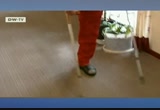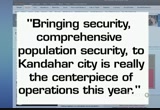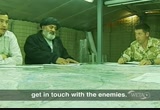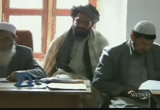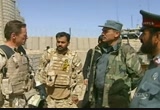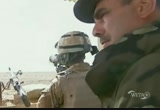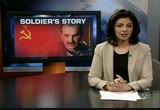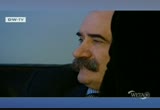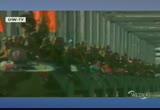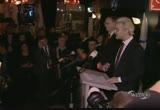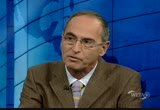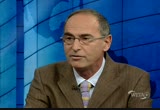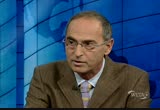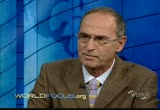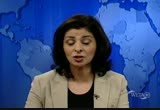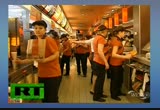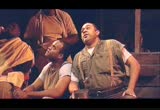tv Worldfocus PBS March 4, 2010 5:30pm-6:00pm EST
5:31 pm
tonight on "worldfocus" -- >> as the u.s. and its allies plan for another big offensive in afghanistan, the bigger challenge of winning hearts and minds inside the tent and mind of a tribal leader. the legacy of afghanistan, years after the soviets withdrew in a humiliating defeat. their war lives on. what some say about the current conflict. as israel and the palestinians move toward resuming indirect peace talks, we will talk with a veteran journ a.alist who has covered t conflict for decades, martin fletcher is here. it wasn't just a restaurant, it was a first taste of freedom. from the different
5:32 pm
perspectives of reporters and analysts from around the globe, this is "worldfocus." major support has been provided by rosalind p. walter and the peter g. peterson foundation, dedicated to promoting fiscal responsibility and addressing key economic challenges facing america's future. and additional funding is provided by the following supporters -- good evening. welcome to "worldfocus" i'm daljit dhaliwal in new york. tonight we start with a look at whether a war in afghanistan is headed. the focus is helmand province in southern afghanistan. as the battle for marjah goes on, nato is making plans for an even larger campaign in
5:33 pm
khandahar afghanistan, the second largest city in the center of the taliban insurgency. to help manage that growing effort, "the wall street journal" reports that the u.s. and its allies will create a new u.s.-led command in south afghanistan led by an american general. bringing security, comprehensive population security to khandahar city is really the centerpiece of operations this year. beyond that, general david petrais, the commander of the wars in afghanistan and iraq describe the broader goals for afghanistan. >> it's not going to be a western industrialized democracy any time soon, but it's a country that can have a central government that then ties into traditional local organizing structures and can again keep out these extremists. >> in tonight's lead focus, we look at those efforts of
5:34 pm
building trust, and we chose a report by alex thompson of itn who gained unusual access to local officials and ordinary people. >> reporter: in a tent in the british base, we meet ali habib boullah. they may want a deal to lay down their arms. >> we would like to get in touch with the enemies. they would like to lay down their weapons and join peace. i'm trying to listen to them, ands are. what they expect from them. >> so you see, the habi habib boullahs of the world are
5:35 pm
helpful to men like this, perhaps the last chance to get out of the country. officials trusted by the people in the bazaars not to line their own pockets or worse. walkouts of the camp here, which you can't safely do if you take the foot patrol of british and afghan soldiers, and you can see nato's last hope emerging from the ground. they're building new offices for mr. habib boullah. government in an area which has had no government for years. >> the civil service, in which the after begans wo s afghans n is not corrupt. step outside, there are big problems with that. come and hear what i mean. >> reporter: the emerging government here will count for
5:36 pm
nothing if the americans leave too soon. and these afghans believe they will, and their own forces cannot possibly cope. >> can afghan police, can the afghan army keep control against taliban? >> no, not really. not control. >> reporter: so the police bosses in helmand have some job to do. the biggest opium industry on the planet and an insurgency backed by iran to the west and pakistan to the east. who would be a cop in helmand. no wonder the british have brought in teams of super cops from kabul with a bit more real training to get things going. >> originally we had bad placement, and, therefore, we needed them to come in force to come over to gain the local -- the local population hate d the,
5:37 pm
and in some insubstances they still do. they came down and got the population on their side and won them over. >> reporter: here they're worried the taliban will murder them by night. >> that's why we have these vehicles here, they have the night sight so they can be put on the road to protect. in the central positions here, there will be binoculars. as long as they share the security tasks, we'll be able to see. >> suddenly, colonel sharp plays his joker, saying this is all very well, but what matters is us and trust. ys, if you bri many more he troops from all over the world, you won't succeed. only us having good relations with local people, that's the way to succeed. getting local support. it's t only way to win. there is much to discuss. for afghans, their army and their police, the sheer ambition
5:38 pm
of nato's exit strategy is colossal and not yet inside by any means. alex thompson, channel 4 news, helmand, southern afghanistan. >> it's always been said that defeating the taliban on the battlefield in southern afghanistan would be the easy part. but the true measure of success will be whether some semblance of normal life can be restored in the region. for more on the challenges that lie ahead, we're joined by marvin weinbaum. thank you very much for joining us on the program. >> surely. >> we just saw a report about a group of afghan civilian leaders taking the reigns from british forces in one afghan town. in general, who are the afghans that nato is pinning its hopes on? can they be trusted? >> well, we are looking now at reempowering some of the people who had previously been
5:39 pm
influential and lost influence to the taliban. but also i think the government wants to bring in new people, a new administrative system and also to bring in -- and that's very important, a police force that the people have some coidence in. >> are these groups of people that can be trusted? >> you know, the truth is,we don't know. what we do know is that they will go with whoever they think will deliver for them. i don't think that the people that we're worried about are necessarily in line with the taliban. they could just as easily switch sides if we make it worth their while. if we give them a sense of ownership, that what we are able to accomplish there, it's worth keeping. that's going to be the tough task. >> now, nato is planning a major offensive in neighboring khandahar, what can we expect to see there? what can you tell us about that? >> i think this is terribly
5:40 pm
important, khandahar is the second largest city. it is the heartland of the taliban. what we are trying to do here is not only to secure the population, but to send the message, the perception really that now we have turned things around. this is what's so critical. we're fighting a war of perceptions, and we've got to give people the sense that aligning with the international forces with the central government is now going to be the future. it's -- we've got the initiative, and that the taliban have lost the initiative. >> but why khandahar, though? isn't it already under the control of the afghan government? >> no, it's not. although there is a strong presence there by something called the khandahar shura, who is the half brother of the
5:41 pm
leader. he shares power with the taliban. the taliban have shadow administration in the country and are able to keep out western forces. five years ago, it was quite safe to walk around in khandahar. today, that's not at all the case. we've got a lot before us if we're going to secure that very important city. >> okay, marvin weinbaum, thank you very much for joining us. >> you're very welcome. >> and that takes us to a remarkable story that we found today about the legacy of an earlier war in afghanistan, the soviet occupation of the country in the 1980s, which ultimately ended in defeat and the withdrawal of soviet forces. our german partner deutsche welle looks at the lasting impact and lessons of the war, largely through the experience of one former soldier and what he still faces today. >> reporter: duncan is blind, he always waits at the elevator
5:42 pm
when his 10-year-old son comes home from school. he lives with his wife and son on the outskirts of moscow, his older son has already moved out of the family's two-room apartment. a former soviet soldier, he's been blind for 24 years, since the day his unit was ambushed while on patrol in khandahar. today he and his family live off his disability pension which amounts to some 400 euros a month, and the money his wife brings in from her part time job. he says the war belongs to the past, and he no longer suffers from nightmares. he stud dead law, studying with the help of a cassette recorder, but his disability prevented him from finding work. >> translator: i turned 18 in march, and by april i had been
5:43 pm
drafted. i spent the first three months doing basic training on the black sea. after that, i went straight to afghanistan, to khandahar. i drove pply trucks, the ambush happened a year later, it was a mortar attack. when i regained consciousness, i was blind. his wife is a nurse, the couple met while he was in hospital. they struggle to deal with the legacy of the war for a long time. >> i don't need to tell what you it means for a family. it's a huge psychological burden to live with that sort of trauma. everyone suffers, women, the children. >> reporter: one son wants to be a vet, he wants to travel to mexico and doesn't like to hear
5:44 pm
his father talk about the war. a new film has been released in russia that explores the legacy of this terrible war, the repercussions were felt long after the soviet troops withdrew. these war veterans have been invited by a moscow newspaper to watch the film together. former soviet commander in afghanistan is among the guests. when the film is over, the former soldiers share their experiences and discuss what lessons could be learned by the nato led force fighting the taliban today. >> translator: the invasion was a mistake. violence will achieve nothing in afghanistan. the second mistake was that we let ourselves in for a very long war. and we were trying to impose our ideology, our way of life on the after begans. that was our third mistake.
5:45 pm
but it took the soviets a long time to recognize their mistakes, soviet forces remained in the area for many years. the conflict claimed the lives of one million afghans, most of them were civilians. by the time the soviet forces pulled out of afghanistan in 1989, 15,000 soldiers had died and 60,000 returned home wounded. many now have to live with the consequences. this help center is called the chess ire home and was set up by a british community.
5:46 pm
everyone here is skeptical of the current war in afghanistan. shagay was posted at the age of 18, he's had kidney problems ever since. >> when i watch the news, i'm reminded of what we experienced back then. occupation is occupation, and the afghans will fight any outsiders, down to the last man, we have no business being there. nor do you now. if i were german chancellor, i'd pull out, otherwise you'll soon have wounded veterans, plus the afghans have to deal with their own problems. the official russian line is different, moscow has repeatedly wa warned the west that leaving prematurely would be a mistake. he wouldn't mind sending his son to the army, but on the
5:47 pm
condition he is never exposed to an actual war. this was another deadly day in iraq, as the country began early voting for nationalpar la mentry elections. two bombings hit voters outside polling stations, many of the victims were believed to be security personnel working on election day. the attacks fuel concern about a wave of violence as the election approaches this sunday. the court found they operated as a german cell of a radical islamic group and plotted bomb attacks against american citizens and facilities, including the u.s. air force base at ramstein, two of the men
5:48 pm
are germans who converted to islam and the other two are turkish citizens. they were convicted of preparing explosive devices and conspiracy to commit murder. they confessed to the crimes during their trials. that leads us to another story that caught our attention from europe. in holland they held municipal elections today in cities and towns across the country. some of the results are striking. the freedom party, a populous anti-islam, anti-immigration party led by two of those elections. in one city, mira it came in first and in the hague it came in second. the party wants to outlaw the wearing of muslim head scarves in holland. we would like to know what you think about all of this. tonight's question, what do you think can and should be done gr
5:49 pm
and growing anti-sentiment in europe. you can give us your opinion by going to our website at worldfocus.org. we reported extensively yesterday on the likely resumption of peace talks, four months of indirect talks between israel and the plinz. george mitchell, president obama's middle east envoy will shuffle between the two sides. today the israeli newspaper reports the talks could begin as early as this sunday. few people know the middle east as well as our next guest, martin fletcher spent nearly 20 years as the tel aviv bureau chief for nbc news. over the years he's reported from scores of countries, including afghanistan, iran and
5:50 pm
somalia. he recounts those experiences in his book "break news." welcome to the program. >> thank you. >> when we hear about israel, when we hear about the west bank, it's mostly stories of violence. what is it, do you think that americans aren't hearing about that part of the world? >> that's a good question, a great untold story, of course, which is israel, despite the -- after the accurate and imperative need to solve problems with the palestinians, it's nevertheless a great place. so many people call me up and say, martin, is it safe to visit israel? i say sure. they call me up a week later and say, wow, it's a great place, i had no idea. that is also the subject of my next book. >> these are some of the stories we're not getting to hear about. is there a couple you can recount perhaps briefly that you can tell through your own experience that might surprise american viewers that perhaps
5:51 pm
doesn't make it on to the air? >> i think the high-tech story is an incredible story in israel. you know, every high-tech fair in new york, for instance has more than half of the countries involved come from tiny israel. the story of how they brought into their country the million russians in ten years and how they developed their high-tech and technology industries, of course the weapons industries is a great untold story. it's a great way of looking at israel not from the moment of violence. >> let's take a look at the news story for a moment, this is a traumatic time for news industries, they are scaling down their operations. as someone who has worked in international news. do you worry about what's going to happen to foreign news reporting and kpoenccoverage? >> i no longer worry about it, i know what's going to happen.
5:52 pm
it's disappearing. ot watching broadcast news in the numbers they used to. if you want to watch foreign news on nbc or cbs, it's there, but it's on their websites. it's changed. it's true, you don't need these gigantic operations we had. we used to have 15 staff members at nbc now there's 3. it's a matter of going where the audience is. there's less foreign news on the networks but more on the internet. that's where we have to go. >> americans find it hard to get their head around international issues, that they find it too abstract. is it something that you buy into? and do you think that it's even true? >> certainly, it's true. a producer of mine once, i was doing a swing through afghanistan wane he called me and said, don't give me any more
5:53 pm
stories from any more countries that end in stan. we didn't know much about afghanistan when it broke up. our job is to make people care by doing stories that are important in an interesting way. >> how do you make them care? how do you get across the point that it is important? >> people care about people. you have to find a way to tell the stories, in an interesting way, and that's normally, we don't care about the government or the -- no one cares about the government of afghanistan or government of iraq. but you can be made to care very much so about an individual, a woman in afghanistan, who's finally able to walk around -- suddenly somebody come as long and throws acid in her face as happened to a girl in a school i visited outside kabul. how could you not care about that? you have to care about that. i think people do care about that. if the story is presented in an interesting way. from that small story, you tell a bigger story.
5:54 pm
>> thank you, martin fletcher, for joining us. >> thank you for having me. finally tonight, they called them delicacies back in 1990, when some new and exotic foods came to moscow for the first time. it was the opening of a restaurant called mcdonald's. the company recently marked the 20th anniversary of that opening. we were struck by how oksana boyko told the story. mcdonald's was much more than fast food. >> long lines for fast food, and a taste of freedom in a locked country. when mcdonald's opened its first restaurant in russia 20 years ago, the borders were closed, the choice was dismal.
5:55 pm
to many soviet people, french fries tasted more like freedom fries. >> back then, in order to travel to a foreign country, one needed to get all sorts of permissions. for many, walking through mcdonald's door, it was like another world for us. >> reporter: among those who endured hours in sub-zero temperatures to try her first big mac, while she's no fan of junk food, mcdonald's menu was full of delicacies. >> people were coming here from all around moscow. some had driven from other cities. when guests came to visit, taking them to mcdonald's, was just as important as showing them around the kremlin. >> reporter: it took mcdonald's 14 years of negotiations to open its first outlet. once the golden arches appeared
5:56 pm
in moscow, it meant far more than just business expansion. >> mcdonald's was not so much a fast food chain, but a symbol of freedom, a symbol of the western values coming to russia. no wonder the communist party objected so fiercely. in the end it didn't have a choice. >> reporter: with more than 230 outlets across russia, mcdonald's now controls about 2/3 of the fast food market. the arrival of mcdonald's in moscow was a sign of changing times, but it was also a very good business decision. today these locations continue to be the golden arches largest in business in the world, while russia a whole goes behind sales. that is worldfocus for now. a reminder that martin savage discusses the new dispute over
5:57 pm
the falkland islands on our weekly online radio show. i'm daljit dhaliwal, good night. -- captions by vitac -- www.vitac.com major support for "worldfocus" has been provided by rosalind p. walter and the peter g. peterson foundation, dedicated to promoting fiscal responsibility and addressing key economic challenges facing america's future. and additional funding is provided by the following supporters --
247 Views
IN COLLECTIONS
WETA (PBS) Television Archive
Television Archive  Television Archive News Search Service
Television Archive News Search Service 
Uploaded by TV Archive on

 Live Music Archive
Live Music Archive Librivox Free Audio
Librivox Free Audio Metropolitan Museum
Metropolitan Museum Cleveland Museum of Art
Cleveland Museum of Art Internet Arcade
Internet Arcade Console Living Room
Console Living Room Books to Borrow
Books to Borrow Open Library
Open Library TV News
TV News Understanding 9/11
Understanding 9/11
